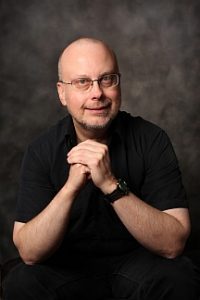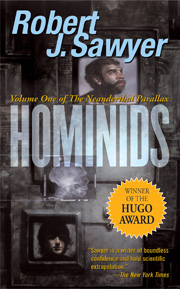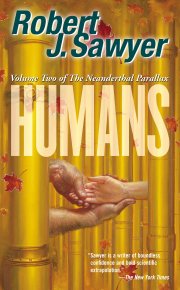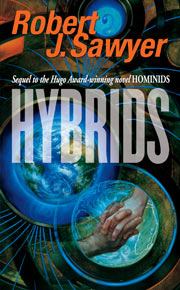Podcast: Play in new window | Download | Embed
Subscribe: Apple Podcasts | Spotify | Amazon Music | Email | TuneIn | RSS | More
Welcome to the very first episode of The Worldshapers: Conversations with science fiction and fantasy authors about the creative process. After a brief discussion of why this podcast exists, and who your genial host is (that would be Edward Willett), we plunge into the meat of the episode: a conversation with Robert J. Sawyer.
Website: www.sfwriter.com
Twitter: @RobertJSawyer
Robert J. Sawyer’s Amazon page
The Introduction:
 Robert James Sawyer is a Canadian science fiction writer, born in Ottawa and now living in Mississauga. He’s the author of twenty-three novels and innumerable short stories (well, not literally, obviously they’re numerable, but it’s a large number), and is the most-awarded science fiction writer of all time, said awards including the Hugo, the Nebula, and the John W. Campbell awards: he’s the only Canadian author to have won all three. His books regularly appear on the major bestsellers’ lists in Canada, and have been translated into numerable (as opposed to innumerable) languages. Rob is a graduate of Ryerson University (where one of his classmates was Tanya Huff, guest on Episode 2 of The Worldshapers) which presented him with its Alumni Award of Distinction in 2002, and in 2007 received an honorary doctorate from Laurentian University in Sudbury, Ontario. In 2016 he was named to the Order of Canada, the highest civilian honour bestowed by the Canadian government.
Robert James Sawyer is a Canadian science fiction writer, born in Ottawa and now living in Mississauga. He’s the author of twenty-three novels and innumerable short stories (well, not literally, obviously they’re numerable, but it’s a large number), and is the most-awarded science fiction writer of all time, said awards including the Hugo, the Nebula, and the John W. Campbell awards: he’s the only Canadian author to have won all three. His books regularly appear on the major bestsellers’ lists in Canada, and have been translated into numerable (as opposed to innumerable) languages. Rob is a graduate of Ryerson University (where one of his classmates was Tanya Huff, guest on Episode 2 of The Worldshapers) which presented him with its Alumni Award of Distinction in 2002, and in 2007 received an honorary doctorate from Laurentian University in Sudbury, Ontario. In 2016 he was named to the Order of Canada, the highest civilian honour bestowed by the Canadian government.
He’s also a popular keynote speaker for conferences of all kinds, and an excellent writing teacher, as I have reason to know, since I twice attended week-long Writing With Style writing classes taught by Rob at the Banff Centre, out of the second of which came my own Aurora Award-winning novel, Marseguro.
The Show:
Since we’ll be discussing The Neanderthal Parallax trilogy in detail, we start with a discussion of “Neanderthal, or Neandertal?”
Quote: “Fads come and go. That was a meme of the early 21st century.”
We move on to a discussion of Rob’s impetus for writing science fiction:
“I’m the first generation fo science fiction writers who came into the field through media as opposed through the pulps…I was hooked by Gerry Anderson’s Supermarionation series.” Rob goes on to note the first Star Trek episode he saw, “The Devil in the Dark,” at age six, hooked him on theshow, to this day his favourite science fiction media series. As well, he points out, in the 1960s and early 1970s, there was an actual space race!
He recalls going to see 2001: A Space Odyssey with his father, and reflecting that all the visions of the future he was seeing would come true by the time he was the age his father was then.
His first piece of fiction: Lost in Space fan fiction when he was ten years old. A couple of years later he read Trouble on Titan by Alan E. Nourse, who wrote in his intro about the joys of being a science fiction writer and said “you could do this too.” Rob notes that he never met Nourse, but in a very real sense he owes his career to him.
We go on to discuss Rob’s writing process. “I write science fiction to fund my research hobby,” he says. Since he sold the Neanderthal Parallax as a trilogy, he was able to spend an entire year researching it.
“Being a writer is like being a grad student who gets to change his thesis topic and even his field of endeavour as often as he or she wishes,” Rob says.
He talks about how the trilogy began with a conversation with Tom Doherty at Tor Books about writing licensed properties. Rob was interested in classic Planet of the Apes; the property that was finally offered to him by Tor was Earth: Final Conflict; he decided that wasn’t a good fit but wanted to do something that would let him do everything Planet of the Apes did for him: social commentary on the human condition from a slightly skewed angle, i.e., a parallax.
Research included lots of reading and attending scientific meetings to talk to every major expert on Neanderthals, asking, “If they hadn’t died out, what would they be like?”
He came up with three pillars of such a society, all based on solid scientific research: no religion, males and females led largely separate lives, and Neanderthals were so much stronger than homo sapiens that any physical altercation could prove fatal: any Neanderthal could kill another with his or her bare hands. “I wanted to explore the interpersonal relations, the society that would grow out of having to eschew violence.”
The alibi archive, based on implanted devices that record every bit of a person’s life, was an extrapolation of that. If everyone is strong enough to kill anyone, then how do you ensure a peaceful society?
Experts’ reaction? “Lovely.” Rob notes that the first book is taught at Johns Hopkins in an anthropology course.
In an aside, Rob notes that he told Eastman Kodak twenty years ago that they could save their business by developing life logging, based on the idea that you don’t recognize “Kodak moments” until it’s too late. It’s definitely coming, but Kodak didn’t do it, any more than IBM developed tablet technology–even though it appeared, with their name on it, in 2001: A Space Odyssey. Rob says, “Almost never does an old company transfer to a new technology. ”
Rob says story development for him is very much top-down, staring with the big idea that in an alternate world, Neanderthals survive to the present day and we don’t–and a portal opens between the two. “I wanted to do social commentary,” he says, and soon realized he was writing about masculinity. To those who complain the books are anti-male, he points out that that’s specified in the opening quote, from Richard Wrangham and Dale Peterson’s Demonic Males: Apes and the Origins of Human Violence. Rob’s thesis: we don’t have to be this way. What would it be like if manhood wasn’t measured by how mean, nasty, and selfish you were?
Another influential source: a book that made the case there must have been some natural selection toward sexual violence: A Natural History of Rape: Biological Bases of Sexual Coercion, by biologist Randy Thornhill and anthropologist Craig T. Palmer.
This led to his main characters: a woman, his main female character, recovering from a rape, and a male universe that had eschewed all masculine violence. “I wanted to write about that kind of sexual politics, and the politics of masculinity, how we could be better men.”
Ponter Boddit, his main Neanderthal character, is his platonic ideal: caring, compassionate, empathetic, non-competitive, and yet clearly male through and through.
The result is what some call “The most unusual romance story you’re ever going to read.”
Plotting: the alibi archive is a kind of “miracle technology,” so how could it fail? Deep underground…like in the Sudbury Neutrino Observatory, which in Ponter’s world is a quantum computing research facility. A portal opens, Ponter comes through, and almost drowns in the heavy water tank.
Rob’s process of plotting was summarized by Theodore Sturgeon: “Ask the next question.”
Rob does a lot of plotting on the fly. “I’m a big advocate of detailed outlining, but I’m not not a big practicer of what I preach.”
Rob notes he has never belonged to a writer’s group, which he calls an unintended outgrowth of cheap laser printing. “Most truly successful SF & fantasy writers over the last twenty-five years…when writers’ groups became common…never have and never would contemplate belonging to one.”
He contrasts a typical writers’ group with the writers’ room of a television series, like Flash Forward, based on his book of the same name, where there is a constant back and forth, question and answer–a constant interrogation. In a good writer’s room, “the best idea wins.”
Rob’s a huge believer in rewriting–he calls his first pass, in a phrase he thinks he got from Edo van Belkom, “the vomit pass,” adding, “it’s an unpleasant process getting it out but you actually do feel better.” He does many drafts, but when he hands it in to his editor, his goal is to have it to the point where the editor has a single word of response: “Great.” He adds that most of his books have been published with no editorial changes whatsoever.
The exception was when he was working with the late David Hartwell at Tor, whom he says in a number of cases “materially harmed” his novels. “I’m not averse to editors but David, I do believe,felt to some degree he was co-author of the piece.” You can read more about this in his latest column for Galaxy’s Edge.
Rob hopes his books will have an influence on society, but it’s difficult to quantify. “This is the observer effect in quantum mechanics. You cannot observe a situation without changing a situation.” He points out that 1984 was not like the 1984 in George Orwell’s book of the same name, but that doesn’t mean he was a failure: it was thanks to his book it took us all the way to 2018 to end up in a a 1984 situation. “George Orwell predicted in essence state-run propaganda news agencies; he did not predict people would tune into them willingly.” The book still informs our understanding of totalitarianism.
Similarly, Margaret Atwood hoped to derail further inroads into women’s reproductive rights when she wrote The Handmaid’s Tale, although they remain under threat. Rob says he sometimes think SF only manages to, at best, forestall bad situations for a few decades.
In his own work, Rob is proud of having had two novels in the trilogy nominated for the Gaylactic Spectrum Awards at the dawn of the millennium, and of the ethnic diversity he portrayed in his work that exactly mirrors what he sees when he looks around Toronto today. “I do feel I’ve been a small part of a movement, a literary and social movement that has helped shape our reality.”
Rob thinks the concept of worldbuilding is the most arrogant notion in the field, whether you’re a theist or atheist. He says the task of making a world seem believable in science fiction is more like theatre set decoration: “What two, three, four, five pieces of setting and prop can I put on the stage that will suggest a real world?”
He agrees that the worlds of “literary” fiction are just as much make-believe as those of science fiction. Mystery fiction would have you believe most crimes are solved; romantic fiction would have you believe true love triumphs. In fact, most crimes remain unsolved and half of all marriages end in divorce. “There is no correlation between what we take as the cornerstones of our so-called mimetic mainstream fiction and reality.” A lot of literary fiction takes place in “A world in which the self-indulgent minutiae of our day-to-day lives is important.”
To wrap up: Rob’s next book is an alternate history of the Manhattan Project, The Oppenheimer Alternative. “For the first time in history, science and policy intertwined, world events turned on scientists. Many came to have regrets on both sides. My big theme is the moral obligations of scientists ot the new world their inventions create.”




Bravo Ed (and Rob)!
The first installment was an excellent way to spend an hour. I’m looking forward to the next episodes, although I fear it will mean having to find extra hours in my weeks.
Thanks, Tony! I’m looking forward to talking to many more fantastic authors.